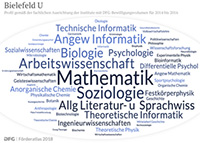© Universität Bielefeld
uni.news
Published on
9. Juli 2018
Category
General
DFG Funding Atlas: Excellent Results for Bielefeld University
Outstanding: computer science, mathematics, psychology, and sociology
Bielefeld University’s researchers are particularly successful in obtaining third-party funding from the German Research Foundation (DFG). This is one of the findings presented in the 2018 DFG Funding Atlas published today (5/7/2018). The Atlas compiles DFG funding awarded to universities for the years 2014 to 2016.
 Bielefeld University’s success is evident both in the overall assessment of the awards and in individual subject areas. When looking at universities as a whole, the Funding Atlas explores what amount of third-party funding was obtained from the DFG on average across all universities by a researcher in a respective subject? These values are set in relation to the size and subject structure of the university. This enables comparison of universities that in part differ considerably in profile and size. This time, Bielefeld University lies higher than 40 per cent above the average in terms of total academic staff (professors and research associates) and thus ranks number 3 in Germany and number 1 in North Rhine-Westphalia.
Bielefeld University’s success is evident both in the overall assessment of the awards and in individual subject areas. When looking at universities as a whole, the Funding Atlas explores what amount of third-party funding was obtained from the DFG on average across all universities by a researcher in a respective subject? These values are set in relation to the size and subject structure of the university. This enables comparison of universities that in part differ considerably in profile and size. This time, Bielefeld University lies higher than 40 per cent above the average in terms of total academic staff (professors and research associates) and thus ranks number 3 in Germany and number 1 in North Rhine-Westphalia.
Looking at DFG awards in absolute terms – that is to say the total sum of all DFG third-party funding within the timeframe mentioned – Bielefeld University ranks 35th among German universities with 80.4 million euros. In mathematics (11.1 million euros, third place), sociology (11.2 million euros, third place), psychology (7.4 million euros, third place) and computer science (15.4 million euros, fourth place), Bielefeld academics were able to position themselves among the top 20 universities with the highest third-party funding in their respective fields in the subject-related statistics of the German Research Foundation (DFG). Of particular note is the fact that Bielefeld University occupies first place in the scientific discipline engineering sciences, which also includes computer science, when the third-party funding raised (15.8 million euros) is considered relative to staff size.
Third-party funding is the proportion of funding for research projects that does not come from the budget set aside for higher education by the ministry responsible. A large part of third-party funding in Germany comes from public research funding, for example from the German Research Foundation (DFG). Academics apply for this funding in competitive procedures. Published every three years, the DFG Funding Atlas presents comprehensive, subject-by-subject key figures relating to publicly funded research in Germany.
Further information is available online at:
www.dfg.de/foerderatlas (in German)
Bielefeld University’s researchers are particularly successful in obtaining third-party funding from the German Research Foundation (DFG). This is one of the findings presented in the 2018 DFG Funding Atlas published today (5/7/2018). The Atlas compiles DFG funding awarded to universities for the years 2014 to 2016.
Compared to universities up and down Germany, Bielefeld University is particularly successful in third-party funding acquisition.
Looking at DFG awards in absolute terms – that is to say the total sum of all DFG third-party funding within the timeframe mentioned – Bielefeld University ranks 35th among German universities with 80.4 million euros. In mathematics (11.1 million euros, third place), sociology (11.2 million euros, third place), psychology (7.4 million euros, third place) and computer science (15.4 million euros, fourth place), Bielefeld academics were able to position themselves among the top 20 universities with the highest third-party funding in their respective fields in the subject-related statistics of the German Research Foundation (DFG). Of particular note is the fact that Bielefeld University occupies first place in the scientific discipline engineering sciences, which also includes computer science, when the third-party funding raised (15.8 million euros) is considered relative to staff size.
Third-party funding is the proportion of funding for research projects that does not come from the budget set aside for higher education by the ministry responsible. A large part of third-party funding in Germany comes from public research funding, for example from the German Research Foundation (DFG). Academics apply for this funding in competitive procedures. Published every three years, the DFG Funding Atlas presents comprehensive, subject-by-subject key figures relating to publicly funded research in Germany.
Further information is available online at:
www.dfg.de/foerderatlas (in German)